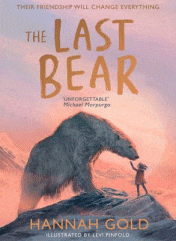
The Last Bear
The Last Bear
Hannah Gold
Levi Penfold
HarperCollins, 2021
304pp., hbk., RRP $A18.17
9780008411282
When her mother is killed in a car crash, April’s scientist father retreats onto himself as he tries to deal with his grief and becomes the epitome of the absent-minded professor, leaving11-year-pld April to pretty much fend for herself. So when he tells her he has applied to man the weather station on remote Bear Island in the Arctic Circle and they will be there alone for six months over the northern summer, April sees it as a chance to reconnect with her dad and start to build a new relationship with him.
However, things don’t work out that way with her dad becoming more and more withdrawn, leaving April to explore the island and entertain herself all day and all night as the sun does not set at this time of the year. Although she has been told that once polar bears roamed the island freely, because of climate change and the melting of the sea ice, there are now no bears left, one evening, on the horizon, silhouetted against the sun , something moves. Something big and loping and gone in the blink of an eye but a polar bear, nonetheless. He is starving, lonely and a long way from home. Determined to save him, April begins the most important journey of her life…
This is one of those stories that stays in the mind long after the final page has been turned – indeed, Michael Morpurgo labelled it “unforgettable”. A modern story that brings the real effect of climate change home it is ideal for introducing children to the concept through their natural affinity with nature as few will be untouched by Bear’s plight and they begin to realise that small, individual actions can have cumulative consequences. Perhaps, like April, the reader will find their own voice and their own passion and despite the obstacles, roar as April does.
But it is more than another story about the environment and its vulnerability, albeit one with such a setting and such a storyline. It is about April finding her voice and her passion as Bear teaches her how to roar from deep-down within as well as learning about that deep grief her father has been experiencing when she has to leave Bear. It’s about hope for families that are permanently changed finding a way to become whole again, if different, and going forward. The most important thing in this world is the relationships we form with others, that shape our knowledge, understanding and values, and this book explores these to the fullest – between April and her dad, April and the bear, and the impact of the island and its isolation has on everyone and everything.
Whether offered as a read-aloud or a read-alone, this is a book so well-written it will be a highlight of the reading year.